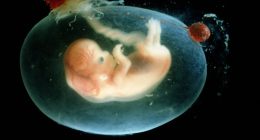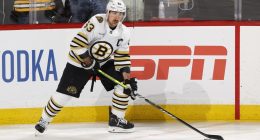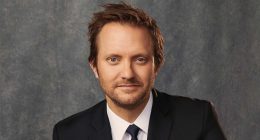Dustin Lance Black is fired up.
The Oscar-winning screenwriter is on Zoom to discuss the Laurent Bouzereau-directed Mama’s Boy, HBO Max’s adaptation of his 2019 memoir Mama’s Boy: A Story from our Americas. The film follows Black traveling to places where he grew up as he details the lines in his family tree and investigates the texture that comes with a Southern heritage.
At the center of the story is Black’s mother, Roseanne “Anne” Bisch, a woman who overcame childhood polio, abusive marriages and Mormon dogma to carve out a life as a dedicated mother to three boys and successful career as a medical technologist in the Department of Defense for 27 years. Bisch, who died in 2014, was also a woman who not only accepted her gay son but inspired his journey of becoming a marriage equality activist after winning an Academy Award in 2009 for writing the biopic Milk.
None of that is why his temperature is rising on this Wednesday morning. Black, best known as Lance rather than Dustin (reasons for which are explained in the doc), is turning red while addressing the political landscape and the deep divide that continues to cause concern across all corners, including the LGBTQ community.
“I have a frustration right now that you can probably sense,” he says. “We’ve let this incredible, valuable investigation of our own differences divide us. Increasingly, I see the Ls, the Gs, the Bs and the Ts fighting with one another and falling for it. Investigate your differences, understand them and know that you’re going to have it worse than others and that some of us need to acknowledge that other people have it worse off. But on the other side of that investigation, understand this is not the discrimination Olympics. You don’t get a prize for having it worse. The prize is surviving those difficulties and having the courage to still lock arms and create coalitions that make it so that a plurality of bigots can’t rule us all.”
The subject is not far-flung from the film because one of the central lessons he says he learned from his mother, one that is well-documented in Mama’s Boy, is how to build bridges between people with different beliefs and political persuasions by way of curious and fair-minded conversation. Speaking of, Black opens up below about how the doc came to be, what he hopes viewers take from his mother’s example and how he’s doing after revealing just last month that he’s on the mend after suffering a “serious” head injury.

First of all, how are you? How are you feeling?
A little better every week. I didn’t even chat about what I was going through until I was feeling significantly better, until I could at least return to work for a few hours a day. I’m on the mend but it’s been an eye-opener. I must say, it’s been really heartening to hear the stories of other people who’ve been through similar things to know that you can 100 percent recover. With an injury like this, some of the things you go through can be frightening and feel endless and, actually, are not endless. The comfort of having other people share their survival stories makes it much better. I’m grateful for that.
I’m happy to hear that. What is the prognosis from here on out?
It’s a challenging one because to get better quicker, you [have to] think less. That’s not my normal mode. I’m trying to shut off and so that means taking things called vacations, which I had not really heard of or experienced. I’ve been doing that. I’ll be back to 100 percent normal within months. Right now, it’s the morning and I feel a 100 percent like myself. A few weeks ago, I would have that for an hour but now, almost three or four. This thing we have between our ears is such a treasure. I always thought that I treasured it but I’m realizing now how much I’d taken it for granted in many ways. We gotta take care of this thing between our ears.
Before we talk about the documentary, I wanted to go back to the release of the book in 2019. It’s one thing to write a script and see that go out in the world but another to publish a memoir and reveal yourself and family history in that way. What was that experience like? How different was it from putting your other projects out in the world?
This was challenging because I’m not objective at all. Biopics or based on a true story tales that I’ve tried to weave in the past … It wasn’t my life. As much as I would try to step into them, I hadn’t been in those shoes. I hadn’t actually lived it. Whereas, with this, I lived every moment — outside of my mother’s 26 years before she had me. I lived every moment. But I had to try and dissect it in the same way I would other people’s stories. That meant, asking myself the question, “Why is this not just interesting but necessary?” If it’s not necessary in some way and you can’t answer that question, don’t do it.
My mom’s ability to defy the politics of her day, to build bridges between people of different beliefs and political persuasions, her ability to share space and have conversations with people who she knew disagreed with her, including me, and to have that kind of courage in sharing space by coming into it with curiosity and not attempting to be right like you’re some 24-hour news channel debate segment — all of that was gold. My mom and I were having these conversations before she passed away and she feared a storm was coming. She saw how political divisions were starting to affect community and family, ours included, and that broke her. It terrified her. Sadly, she was right. That storm came. It’s here, it’s gotten worse. It did feel like it was a necessary story. Once I had that question answered, I had to break it down in note cards, in much the same way I do other people’s lives and I tried my best to sort out what was interesting because everything is going to be interesting when it’s your own story versus what’s necessary. That made a book.
What was wonderful is that Laurent came to me as a director and said he wanted to turn it into a film. I said to him immediately that I wanted nothing to do with the production or direction of this film. I needed someone who was objective to take it on. With Amblin Television, Playtone and LD Entertainment backing him, he made this film. It was really up to him to answer the question of why is it necessary. I really tried to stay out of it as much as I possibly could in terms as it was being created. I have seen cuts but I’ve not even seen the final cut. I saw enough that thought, boy, he’s on the right track. I definitely will stand behind this but this is his film about my mom. This is not my film about my mom, and I’m proud that it’s his film.

Why did you take that hands-off approach?
Well, this is an arrogant thing to say, but if some of the people who I’ve depicted in my films told their own stories, it probably wouldn’t be as good. You would get lost and distracted by things that you find compelling in your own life. It’s often helpful to have an outsider come in and take a fresh look. I didn’t want anyone to think that I put my thumb on the scale. Frankly, I didn’t want to put my thumb on the scale. I tried to have the courage that so many of the people I’ve depicted who are still around have shown me by saying, “Here, I trust you. Go.” In the end, it creates a more trustworthy product. Not always, but sometimes when I see documentaries or biopics that are directed and produced by the person being depicted, I kind of go, “Yeah, OK.” I wonder, what’s real? I wonder, what’s true? By taking myself out of it as a filmmaker — and by also not getting paid — I hope that when you see it, you can believe it.
Wow, I guess I didn’t realize that. You don’t get paid at all?
No. I didn’t get paid. I mean, I got paid in that they bought me the flights and hotel rooms. I got to go back and visit all of these people who formed my mother’s family. I got paid in that I got to spend time again in these places, in Texarkana, in Dallas, in San Antonio, in Salt Lake City, and back in Los Angeles. I got paid that way. I got to put my body where my mouth has been; if I’m preaching about sharing space with people who you might not agree with, let me do that. I got to test my beliefs in reality. That was a great deal of payment. When do we get to do that?
That is more valuable than any paycheck. It was profound to see you, this Oscar-winning talent in Los Angeles known for your work and high-profile activism, back where you grew up. Hearing that accent jump out when you’re speaking to your relatives…
Oh my God, yes.
And to see you standing beside them, having these reunions. I wanted to mention two relatives because they jumped while watching this — your cousins Lynn Mosley and Deborah Westfall. Aside from the power of their presence in your family tree, they seem to signify what you’ve tried to do with your activism. What was it like to go back and engage with them? Because I teared up watching Lynn put his arm around your shoulder. It’s a passing moment but it’s powerful.
Me too. These are people who are my family. They’re my blood. These are people who I had stopped talking to, stopped reaching out to, who I hadn’t been in communication with. Some of that is geographic and some of that is just life. But a lot of that is the fact that we voted for really different people in 2016, and we had strong feelings about why we did that. We had deep disagreements about the things like women’s equality, racial equality and gay marriage. These are people who I’m not supposed to be friends with, according to the headlines these days. So, it was frightening. It’s not easy.
Perhaps people will say, “Oh, this is naïve. This is idealistic.” Yeah, it is. And guess what? It takes a lot of courage these days to be idealistic, to be optimistic. It takes a lot of courage these days to step into a space like that. I don’t want people to feel like these are just nice things to say. I wanted them to witness that they were difficult things to do. For those who are willing to share space with people they know they disagree with, I want them to get that badge of courage. I hope that they see the way I did it, thanks to Laurent for making a film that shows that I entered into these conversations with curiosity because, I think, frankly, these days we are all obsessed with being right. Being right is overrated. I would much rather be called an optimist who is wrong than a realist who is right. It takes a lot of courage these days to be an optimist. It takes a lot of courage these days to enter into those kinds of conversations and spaces with curiosity and not argue — no matter how much you believe you’re right. I hope that when you see that arm around me, it’s because I dared to listen, though I disagreed.

That scene comes after footage of your powerful speeches about equality as this instrumental figure in the fight for marriage equality. It’s striking to witness right now as we move towards midterms and what most likely will be another divisive election cycle. How are you feeling about the stage of things right now?
Sadly, I have to agree with you. I think that the challenges we were facing when my mom started expressing concerns about these divisions have only grown, and they’ve grown on a global scale. This isn’t unique to the United States. Perhaps it never was, but certainly it’s clear that it’s not now. It’s never been more critical to the survival of our own families, our own communities, and by extension, our own country and the well-being of our world, that we stop being chicken shits in our silos and in our trenches. We have to show the courage to share space with people who deeply disagree with us.
Grow up. It’s time for us to grow up again and to ask questions more than make statements. I don’t want people to get me wrong. It’s incredibly important work to investigate our differences, to understand those differences, to know what we need to become a more equal world, and to know what we must demand so that we all have an equal shot in this world. Define your differences. Let your differences fly like a flag. Be proud of them but stop letting them divide you from one another. You can do both at the same time. You can be incredibly different. You can understand the difference. You can stand your ground with the things you need to be treated fairly and equally with those differences. At the same time, you can refuse to let yourself be divided from your neighbors who might disagree with you.
What will your role be or how will you take action in these coming months and years? Your life has changed so much since you fought for marriage equality, you’re married now and a father. You’re also recovering from a scary injury. How will you proceed?
Well, you know what, I was raised by a woman who couldn’t walk. A woman who was told that no one would fall in love with her, that she would never be able to have children, that she would never finish school or have a job. This is a woman who fell in love, had three children and had an esteemed job in medicine where she treated the President of the United States. So, I got hit in the head. Do you think that’s going to stop me for one second? Certainly not. I have the best example in the world that you can survive injury. In fact, you can use that injury to motivate you. When people say, “No, you can’t, you need to slow down,” I can say, “Yeah,” and I’ll hit the gas because right now we need to do that.
I took some time to build a family, which has been a wonderful surprise of my life. I thought perhaps I’d missed that opportunity and it’s been wonderful. Now, it’s time to make sure that that family will be safe. It means creating a world where people of difference can be respected and protected, and not just queer people. So, what is my role? My role is to participate in documentaries like this. My role is to continue to try my best to tell stories that help people understand the value of difference, stories that also excavate a history that’s been covered and buried by legislation that created shame. A queer history of foremothers and forefathers that we need so we don’t keep making the same mistakes over and over and over again.
I have a frustration right now that you can probably sense that, yet again, in the same way that that many people of difference did in the early ’70s, we’ve let this incredible, valuable investigation of our own differences divide us. Increasingly, I see the Ls, the Gs, the Bs and the Ts fighting with one another and falling for it. Investigate your differences, understand them and know that you’re going to have it worse than others and that some of us need to acknowledge that other people have it worse off. But on the other side of that investigation, understand this is not the discrimination Olympics. You don’t get a prize for having it worse. The prize is surviving those difficulties and having the courage to still lock arms and create coalitions that make it so that a plurality of bigots can’t rule us all.

I’m out of time but let’s end with your mother. She lived a life that feels like it demands to be seen. What do you hope people take from her story?
I am incredibly grateful to Amblin, Playtone, LD and Laurent for making it because I do think a documentary makes the narrative more visceral. There’s something about reading a book, which is lovely and wonderful because it lives in your imagination. But you’re in the safety of a room and a page and in the safety of your imagination. That’s ripped off here. You’re going see it and hear it and experience it. The only way to turn away from the reality of it is to turn it off, which I hope people won’t do.
I think my mother is quite inspiring. My mother was a shy person and didn’t want to ever have people see the challenges. She just wanted them to see the successes. If she were around, I think she might be uncomfortable. In her life, I couldn’t convince her how inspiring it was. I hope that people see it and go, “Man, if she could survive that and achieve what she achieved by living with paralysis — really, truly living in it — while having the courage to share space with people who are different in a way towards building bridges that divide and defy the current political landscape, maybe I can do it, too. If that tiny woman who could only walk on braces and crutches can find a higher plane than politics, maybe I can, too.” That’s what I hope people take away from it.

Source: Hollywood









